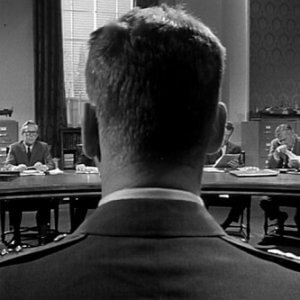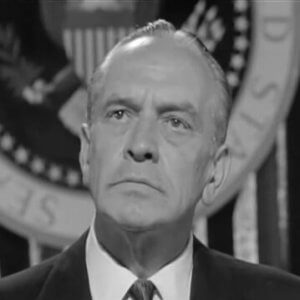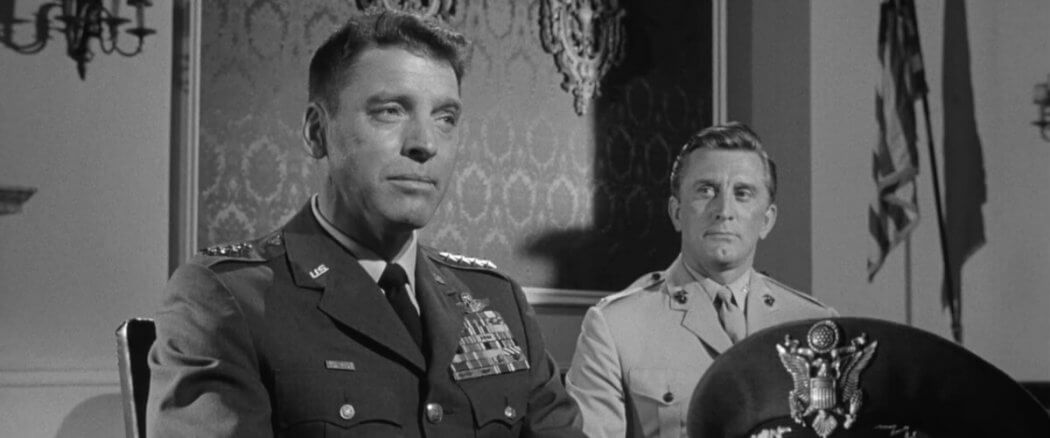“The writer’s role is to menace the public’s conscience,” Rod Serling, the adaptor of Seven Days in May, addressed the Congress in 1968. “He must have a position, a point of view. He must see the arts as a vehicle of social criticism…”*
Serling’s vehicle was a bulldozer, through which he endeavored to level the systems built to steal and control; then he jumped out to flip over whatever tables hadn’t been flattened already. In the company of the “angry young men” of the 1950s U.S. theatre scene, Serling out-raged them all; he was the united states of indignation, a patriot, critic, moralist and egotist. His personally assigned role as the lone voice in the wilderness was at turns sanctimonious and earnest, and it still carries.
“Quite honestly, I don’t think this movie could be made today,” Director John Frankenheimer speculates in the commentary, recorded in 1999. “I think all the values in the country have changed so drastically since the days of President Kennedy…in recent years, the way the office of the presidency has been debased – I don’t think that the public would accept a President as idealistic.” Frankenheimer died just before he was proven wrong. The West Wing (1999-2006) featured not only an idealistic president, but also a Serlingian style. The show was received with a surge of recognition, even relief, and when its creator, Aaron Sorkin, was asked if he could add any one writer to his staff, his answer was Rod Serling. So perhaps that lone voice is one we still need to hear.
Insupportable Negligence
In the near future of 1970, a President, Jordan Lyman (Fredric March), is once again declaring the end of a war, this time a Cold one, cracked open and passed between Americans and Soviets for over 20 years. The mean justifying this end is a nuclear disarmament treaty to be signed by both nations and characterized by Chairman of the Joint Chiefs of Staff General James Scott (Burt Lancaster) as “insupportable negligence.”
 General Scott has been building his own support through open criticism of the treaty and secret organization of a base and militia, which his aide, Colonel Martin “Jiggs” Casey (Kirk Douglas), uncovers and rushes to the President, catalyzing an entire administration into preventing a coup d’etat.
General Scott has been building his own support through open criticism of the treaty and secret organization of a base and militia, which his aide, Colonel Martin “Jiggs” Casey (Kirk Douglas), uncovers and rushes to the President, catalyzing an entire administration into preventing a coup d’etat.
“It was a time of tremendous tension, of tremendous fear in our country,” Frankenheimer recollects. “We’d just come out of the whole horror of McCarthyism…We were engaged in a real cold war with the Soviet Union…there was tremendous fear we were all going to be annihilated…There was [sic] a great many Americans who agreed with the philosophy put forth by General Scott…we tried to present him as a sane, but dangerous, antagonist.”
The Idolatry of Heroism
But General Scott wasn’t an antagonist to Serling and Frankenheimer, who served in the Army and Air Force, respectively. “The enemy is an age,” President Lyman philosophizes, “a nuclear age. It happens to have killed man’s faith in his ability to influence what happens to him. And out of this comes a sickness, a sickness of frustration, a feeling of impotence, helplessness, weakness. And from this, this desperation, we look for a Champion in red, white and blue. Every now and then a man on a white horse rides by, and we appoint him to be our personal god for the duration.”
It’s a searing speech, Serling’s lightning called down upon the idolatry of heroism, a notion that, as Walter Brueggemann articulates, “we can live outside history as self-made men and women.” Yet throughout the script, for every strike against the Military Industrial Complex, there is a counterstrike against Liberal Pacifism. And yes, one strikes out in the story, because Serling had a point of view – but it was through a wide-angle lens, which makes Frankenheimer a perfect match for him.
Forcing Perspective
“Every shot I do forces perspective,” confesses Frankenheimer. “And I’ve done that my entire career. It’s just something that is inherent in the way I tell a story. I think it puts you into the film.”
 It does – as does Saul Bass’ mesmerizing opening title sequence, Jerry Goldsmith’s high-stepping, snapping score and the chain link fence of performances. Every moment is full of active listening and reactive responding, fully captured by Frankenheimer’s camera placement and lensing, ranging from static to dynamic and always motivated by the material and performances. Was there ever a director so theatrically and cinematically integrated?**
It does – as does Saul Bass’ mesmerizing opening title sequence, Jerry Goldsmith’s high-stepping, snapping score and the chain link fence of performances. Every moment is full of active listening and reactive responding, fully captured by Frankenheimer’s camera placement and lensing, ranging from static to dynamic and always motivated by the material and performances. Was there ever a director so theatrically and cinematically integrated?**
To a degree this sensibility can be explained by Frankenheimer’s directorial training during TV’s brief ascension to the summit of drama in the mid-‘50s, when teleplays were “the biggest sociological game in town”*** and Serling wrote some of the best. Each man’s work pointed to the other’s, in a Chinese finger trap of tight, tense storytelling.
Condition for Continued Existence
Enhancing the film’s immediacy was its unprecedented access to the White House, due to fans of the original novel in President Kennedy and his administration. That production trivia became a bittersweet memory after November 22, 1963. In a documentary Serling was summoned to create, which introduced the world to Kennedy’s successor, a then-unknown Lyndon B. Johnson, he wrote:
To the Leftists and the Rightists, to the Absolutists, to the men of little faith but strong hate, and to all of us who have helped plant this ugly and loathsome seed that blossomed forth in Dallas last Friday – this is the only dictum we can heed now. For civilization to survive it must remain civilized. And if there is to be any hope for our children and theirs – we must never again allow violence to offer itself as an excuse for our insecurities, our own weaknesses and our own fears. This is not an arguable doctrine for simply a better life. It is a condition for our continued existence.
Such writing is only sanctimonious in that it claims something is sacred. It is only abstract in that we refuse to practice it. And it is as simple and complex as Colonel Jiggs says near the beginning of May: “Do your duty and…ask for divine guidance.”
__________________________________________
*For this, and further information and insights, I am indebted to Gordon F. Sanders’ extensively researched and sharply written biography, Serling: The Rise and Twilight of Television’s Last Angry Man.
**See The Birthday Party, The Iceman Cometh, The Boys in The Band. These were not film adaptations, they were film incarnations – each possessed by the play it was charged to interpret.
***Andrew Sarris, Dimensions.





